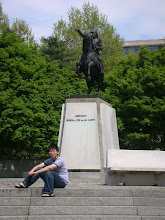
Dear Sirs and Madams,
I just reread Roald Dahl's intensely touching short story "The Boy Who Spoke with Animals". To give a brief summary, the story is narrated by an unnamed tourist in the West Indies who witnesses an extraordinary event. A child intervenes upon a group of tourists savaging a giant turtle on the beach. While the pompous tourists are merely concerned with flaunting their masculinity and turtle soup, the child empathizes and communicates with the sea turtle and at the end of the story escapes from the cruel adult world on the back of the giant sea turtle.
I do not know whether or not this was the acclaimed author's intent, but it seemed to me that this short piece was a critical assessment on colonialism. If it was not, its prevailing message on dignity and the straightforwardness of decency pushes a reader of colonial history to evoke the savage injustices of imperialism in all its splendid façade of marble halls, uniforms, steamships, and trains.
The key elements of the story like the setting on a pristine Caribbean island, its beauty sullied by the boorish conducts of English tourists, and its resident-victim, the sea turtle who "was senior to any of [the tourists] in age," all betray a deep sense of injustice that is undetected to the characters save to the narrator and the boy. The savagery of these self-proclaimed civilized gentlemen are made more evident by their gross appearance such as having "exceptionally hairy chest" while the absence of their shirts "was obviously a calculated touch". This unnecessary overcompensation by the self proclaimed heroes and their absurd actions range from attempting to drag the giant turtle by a rope (as they did in the story) to slaughtering thousands over the control of a desert wasteland (as the Europeans actually did). In imperial propaganda literature masculinity was inseparable from heroism and any decent subject of the crown was clearly required to reflect the prowess of the empire through his arrogance. It is an image which Roald Dahl completely lays to waste with his depiction of the tourists' ludicrousness and barbarity. Dahl further highlights the sinful nature of the patronizing tourists by admiring the turtle who while "[the tourists] were discussing [its] destruction, [its] consumption and [its] flavor... seemed, even when upside down, to be extraordinarily dignified." This was imperialism in its truest form.
The hero of this tale is a boy whose unashamed sentiments for another living being made even the most condescending adults to feel as though they were "caught doing something that was not entirely honorable". The simplicity of the boy's virtues rightly brought "a feeling of uneasiness, a touch even of shame" to the so-awesomely-masculine men. The rejection of this cruel adult world by the boy is celebrated by the narrator who rests assured that the boy is "quite happy where he is".
This short story reminds us that at the end of the day what remains unassailable is not quantifiable rationality like gains and losses in capital, but the unadorned and unpretentious nature of mutual respect and learning to enjoy each other's companionship.
Hat off to you Mr. Dahl.
The children had it right all along.
Best,
Yong Kwon


No comments:
Post a Comment